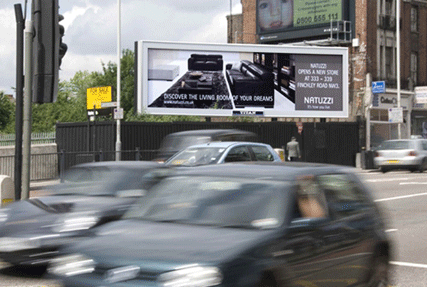YES - Patrick Whitnall, Investment director, press/radio/outdoor, MediaVest
Titan's roadside sheetage has always struggled to compete against its rivals in this sector - largely due to the state of the portfolio it inherited from Maiden, the lack of investment in upgrades over the years and the quality of its offering in London.
Coupled with this, large format has seen the largest declines in both price and revenue. So it was the right time to sell an underperforming part of the business, but not the right time to get the best price for its estate.
The question should be: "Was Primesight right to purchase this portfolio?" Yes. It is a good purchase price, reported to be £6m, it will add scale to Primesight's roadside offering and complement its quality backlights in London.
Huge investment will still be required to upgrade sites, but being a private company will allow Primesight time to ride out the economic gloom and invest and innovate in the formats it has bought.
NO - Andrew Oldham, Former chief operating officer, CBS Outdoor UK
Roadside is recognised as the highest-margin sector in outdoor, with low rents, long leases and strong cashflows. Properly managed, it should be the cash cow of the operation.
Sure, roadside is a crowded sector, with Titan a clear third behind Clear Channel and JC-Decaux, but to get out of this financially attractive sector and focus all efforts into highly competitive, lower-margin sectors seems to go against common business wisdom.
It is well known that the transport business was Maiden's and has been Titan's biggest challenge. I am not convinced it's fixed for the long term to deliver the profits and investor returns expected.
Titan will drop to number five by market share and be leapfrogged by Primesight. Ultimately though, I suspect the reason for selling is less driven by the business model and roadside than by financial issues elsewhere and the need to free up some cash for the business.
YES - Nick Parker, Commercial director UK, Kinetic
We need to look at this in two ways: "Was it right for Titan?" and "Is it right for the industry?" The answer to both questions is "Yes".
For many years, Titan has been seen as the poor relation in this sector to both JCDecaux and Clear Channel UK. The main problem has been its lack of available funds for investment to allow it to enhance the quality level of its plant to ensure it was able to compete on a level playing field. In that sense, the move is right.
Secondary to this, Titan has a myriad of opportunities within its portfolio. Now it can concentrate on the rail and retail sectors where it has a market-leading position.
From the industry point of view, Primesight has always developed very good backlit panels across London and key regional cities. The combination of these panels with the sheetage that Titan has sold will allow it to enhance the quality of its portfolio.
YES - Glen Wilson, Group deputy managing director, Posterscope
The question doesn't really reflect the reality. If I remember my training, a successful negotiation is one where both parties feel they have won, which very much seems to be the case here.
Strategically, Titan's billboard inventory is a better fit with Primesight, which already has an established roadside portfolio of large and small formats.
Conversely, divesting itself of billboards should allow Titan to focus on being a pure-play environmental out-of-home contractor (ie, malls and rail) and specifically to develop the rail out-of-home proposition, an environment that has traditionally been under valued.
From an advertiser perspective, there is still the same amount of competition and choice in the marketplace and, while any investment will inevitably be constrained by the current climate, there is a better chance of this happening when economies of scale exist.


